Learn when Chapter 7 bankruptcy is a better choice than Chapter 13. Chapter 7 bankruptcy remains on your report for up to 10 years and Chapter 13 stays there for up to seven years.
 Chapter 15 Creditors Rights And Bankruptcy Ppt Video Online Download
Chapter 15 Creditors Rights And Bankruptcy Ppt Video Online Download
Chapter 11 and Chapter 13 filings are similar.
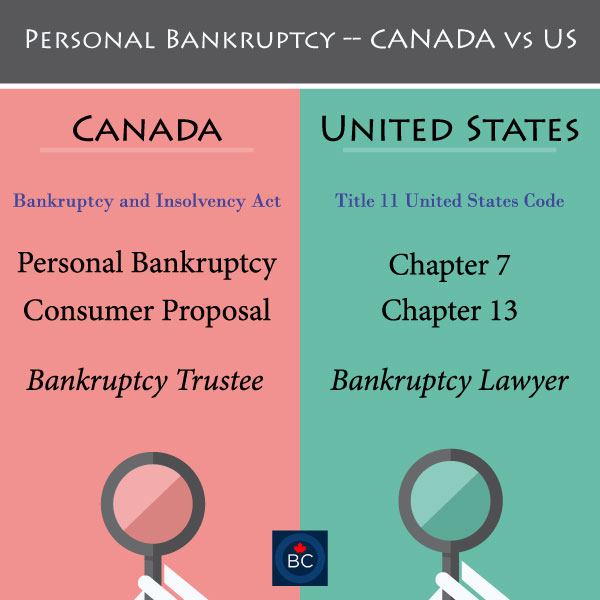
What is the difference between chapter 7 11 and 13. Just the filing fees alone to start a new Chapter 11 proceeding is 171700. Chapter 13 permits the debtor to file a plan in which the debtor agrees to pay a certain percentage of future income to the bankruptcy court trustee for payment to creditors. How Chapter 7 Bankruptcy Works.
While chapter 13 bankruptcy provides for the adjustment of the debts that can be applied only by individuals with specific and stable income level where plan to repay the part or all of debts is made. 1 StraightLiquidation Chapter 7 only. An individual with a regular income who is overcome by debts but believes such debt can be repaid within a reasonable period of time may file under chapter 13 of the bankruptcy code.
Chapter 7 is for a person company or corporation and will discharge the filing debtor in exchange for giving up assets. There is no limit to the amount of money owed by debtors filing for Chapter 11. Chapter 7 does have income limits that vary by state.
However declaring bankruptcy is not without consequences. In addition to Chapters 7 and 11 you may want to look at Chapter 13. Whether you choose to file for Chapter 7 or Chapter 13 youll experience a considerable decline in your credit score which should affect your ability to qualify for loans.
A completed Chapter 13 bankruptcy can stay on your credit reports for up to seven years from the date you file. Chapter 7 Chapter 11 and Chapter 13 bankruptcies all impact your credit and not all your debts may be wiped out. A Chapter 7 will in effect put a business out of business while a Chapter 11 may make lenders wary of dealing with the company after it emerges from bankruptcy.
Chapter 13 is for individuals as is Chapter 11 though the latter was originally designed for corporations. Its not an ideal credit situation of course but you can use the time to manage your debts wisely and make consistent on-time payments. Typically individuals file Chapter 7 or Chapter 13 bankruptcy Chapter 12 is generally reserved for farmers and fishermen while Chapter 11 is usually for businesses.
People who file Chapter 7. The main difference is that the flag for a Chapter 13 bankruptcy is removed from the debtors credit history seven years after filing while a Chapter 7 bankruptcy stays on there for 10 years. Chapter 7 is a popular choice because unlike Chapter 13 it doesnt require filers to pay back a portion of their debts.
There are a lot of reports required for taxes insurance operations and bank accounts. 2 Reorganization Chapters 9 11 12 and 13. Chapter 13 bankruptcy eliminates qualified debt through a repayment plan over a three- or five-year period.
And a typical cost for legal fees might easily be 10000 or 20000 the first year alone. Corporations partnerships and limited liability companies cannot use chapter 13 to reorganize and must cease business operations if a chapter 7 bankruptcy is filed. But you may be wondering what the differences are between Chapters 7 and 13 bankruptcy.
Most people who file for bankruptcy choose to use Chapter 7 if they meet the eligibility requirements. The length of your plan will depend on its complexity. Assess Chapter 7Chapter 11Chapter 13 bankruptcy options.
It is for people who can not afford to pay back their debts. Any individual or business can file chapter 11 of bankruptcy who requires time to make the debt manageable to pay in which the court will help the business to restructure its debts and liabilities. The biggest difference between Chapter 7 and Chapter 13 is that Chapter 7 focuses on discharging getting rid of unsecured debt such as credit cards personal loans and medical bills while Chapter 13 allows you to catch up on secured debts like your home or.
The main difference between the two is the amount of money the debtor owes. Chapter 11 and Chapter 13 Bankruptcy. Chapter 11 is much more complicated and expensive than Chapter 7 or Chapter 13.
Chapter 11 stays on your credit for seven years from filing so this can hinder your financial goals for a long time. Like Chapter 7 Chapter 13 bankruptcy may have a very negative impact on your credit. Chapter 13 offers an immediate and near-guaranteed debt relief while Chapter 13 provides a more favorable repayment option to avoid foreclosure.
Chapter 11 is the chapter used by large businesses to reorganize their debts and continue operating. Chapter 7 is the most common type of bankruptcy and is often referred to as a straight bankruptcy. Chapter 13 differs from Chapter 7 through which individuals can use Chapter 7 to wipe out all their debt entirely.
But some creditors could view a Chapter 13 bankruptcy more favorably than a Chapter 7 bankruptcy.
 Difference Between Chapter 7 Chapter 11 And Chapter 13 Bankruptcy Nathan A Berneman Apc
Difference Between Chapter 7 Chapter 11 And Chapter 13 Bankruptcy Nathan A Berneman Apc
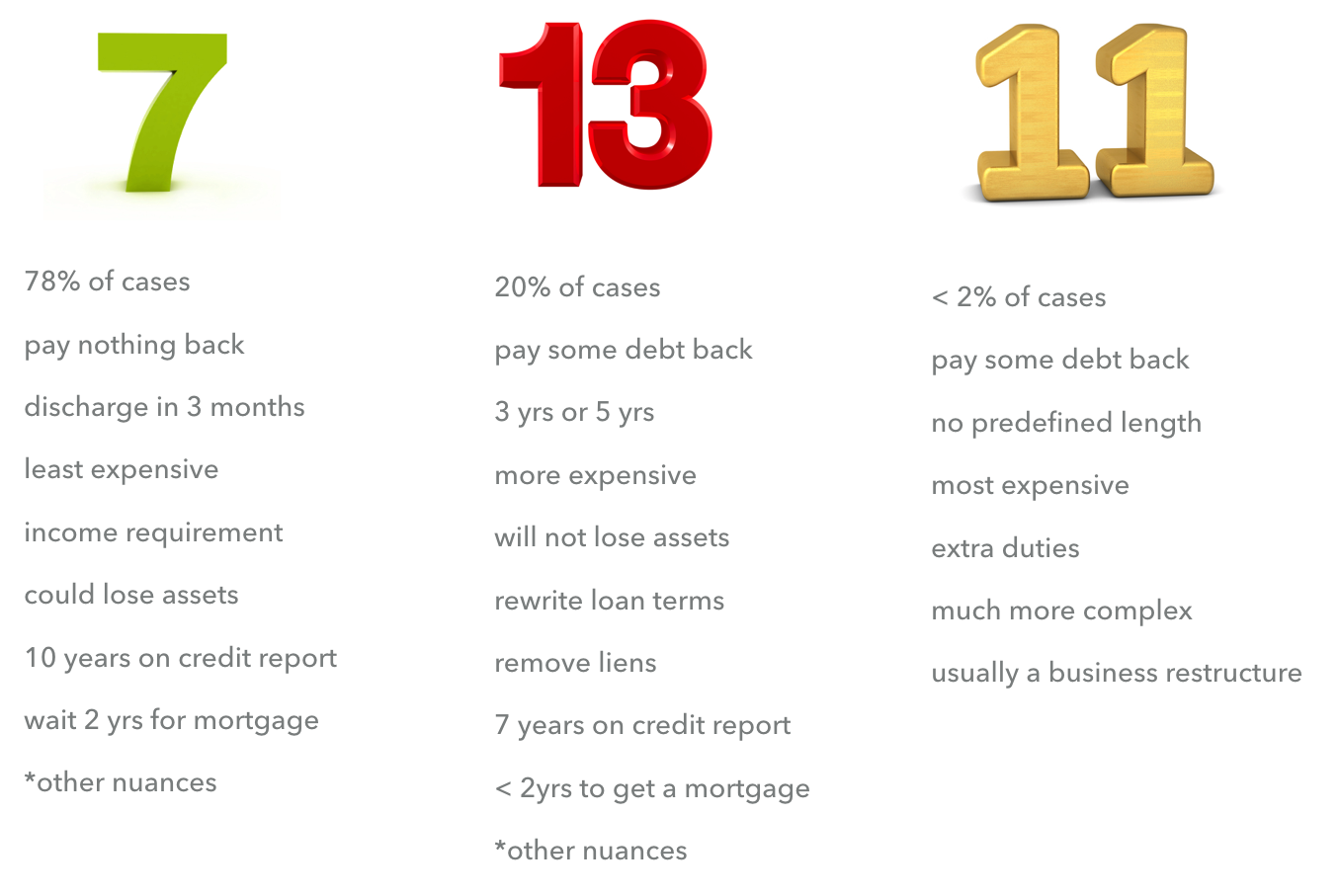 What Is The Difference Between Chapter 7 13 And 11 Ball Bankruptcy Las Vegas
What Is The Difference Between Chapter 7 13 And 11 Ball Bankruptcy Las Vegas
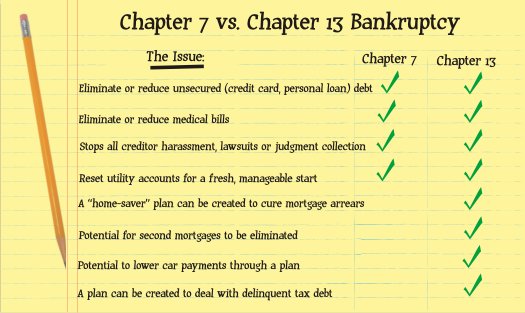 Important Differences Between Chapter 7 And Chapter 11 Bankruptcy You Must Know John T Orcutt Bankruptcy Blog
Important Differences Between Chapter 7 And Chapter 11 Bankruptcy You Must Know John T Orcutt Bankruptcy Blog
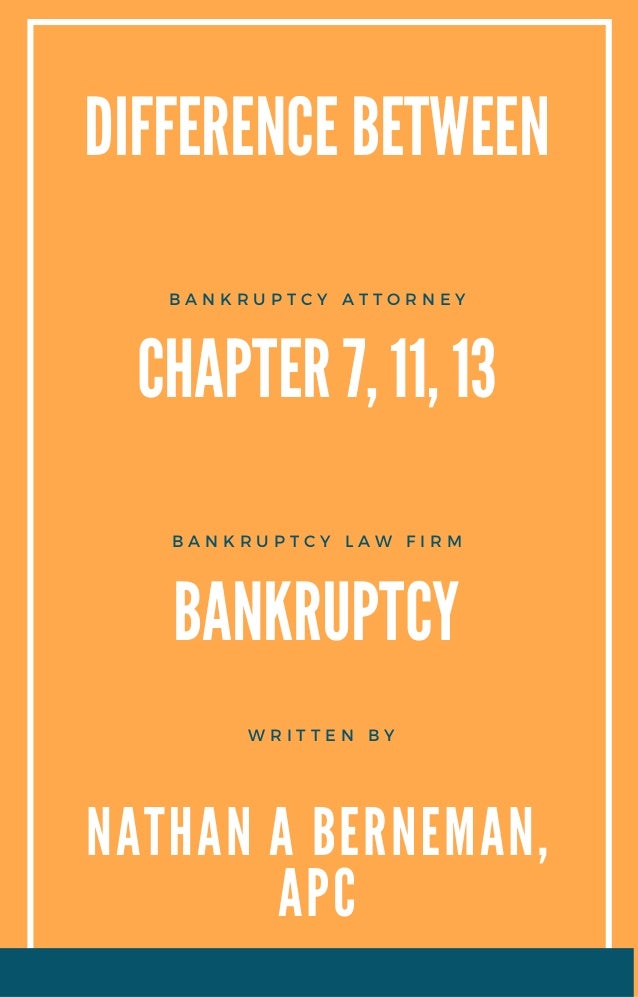 Difference Between Chapter 7 Chapter 11 And Chapter 13 Bankruptcy
Difference Between Chapter 7 Chapter 11 And Chapter 13 Bankruptcy
Introduction To Bankruptcy Course Hero
 Do We Have Chapter 7 Or Chapter 13 Bankruptcy In Canada
Do We Have Chapter 7 Or Chapter 13 Bankruptcy In Canada
Alikhan Law Office Llc In Las Vegas Nevada 702 374 6619
Chapter 7 Vs Chapter 13 What Is The Difference All About Infographic
 Blog Ball Bankruptcy Las Vegas
Blog Ball Bankruptcy Las Vegas
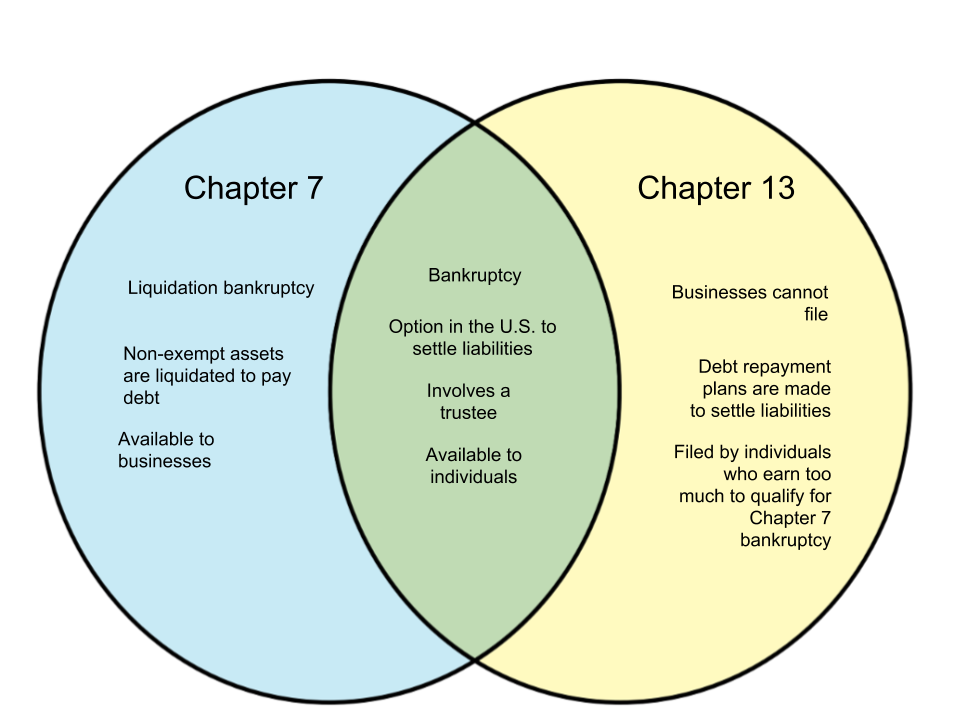 Difference Between Chapter 7 And Chapter 13 Bankruptcy Whyunlike Com
Difference Between Chapter 7 And Chapter 13 Bankruptcy Whyunlike Com
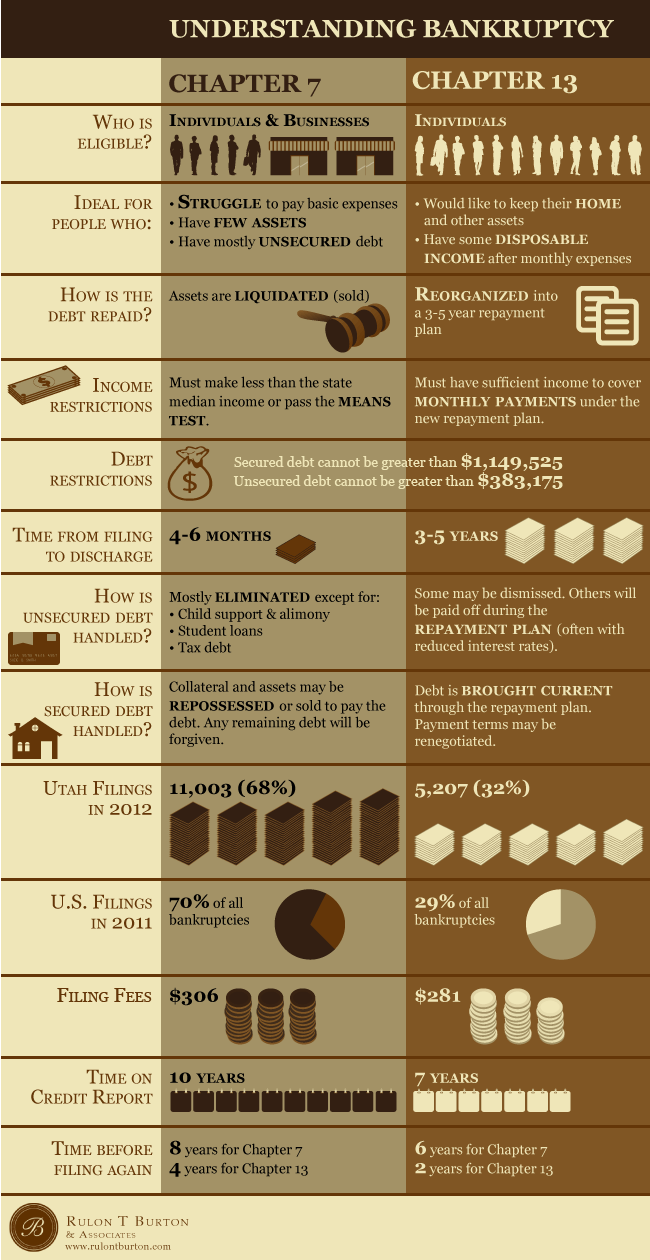 Bankruptcy Info Topics History Utah Bankruptcy Attorneys
Bankruptcy Info Topics History Utah Bankruptcy Attorneys
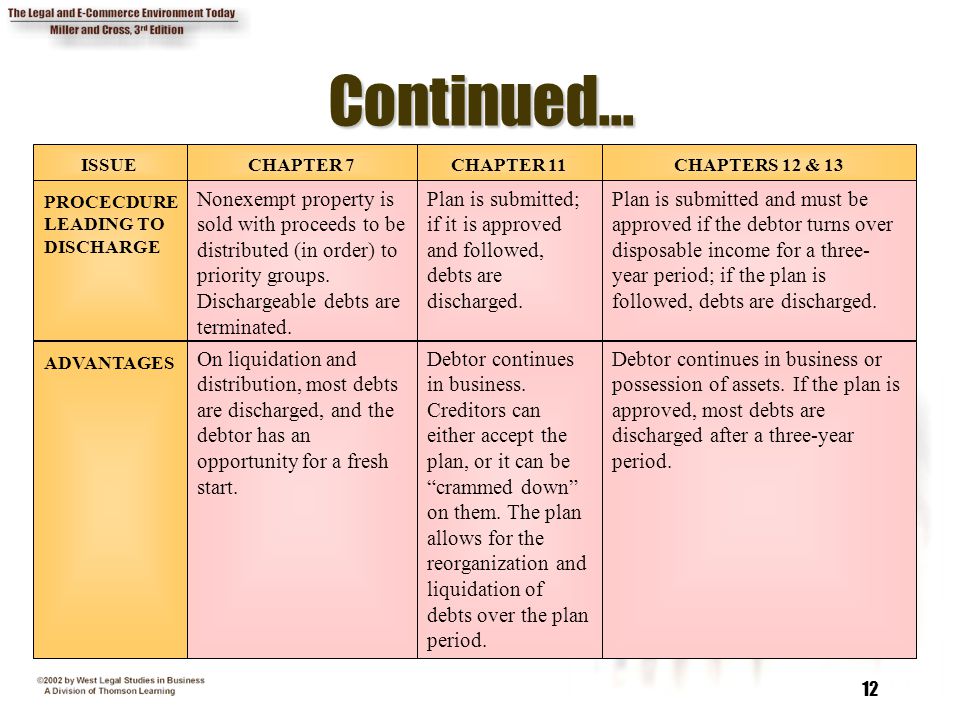 Chapter 15 Creditors Rights And Bankruptcy Ppt Video Online Download
Chapter 15 Creditors Rights And Bankruptcy Ppt Video Online Download
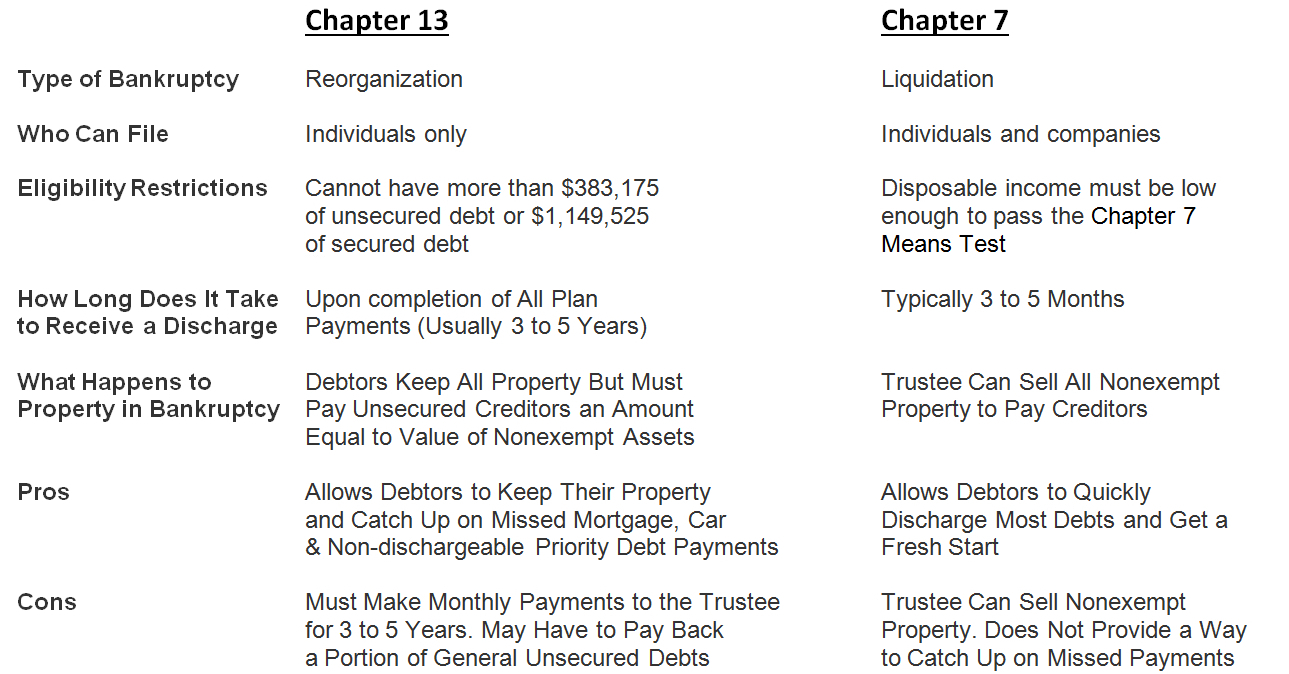 Chapter 13 Bankruptcy Vs Chapter 7 Bankruptcy Advantage Ccs
Chapter 13 Bankruptcy Vs Chapter 7 Bankruptcy Advantage Ccs
 Chapter 7 Vs Chapter 13 Bankruptcy Explained
Chapter 7 Vs Chapter 13 Bankruptcy Explained
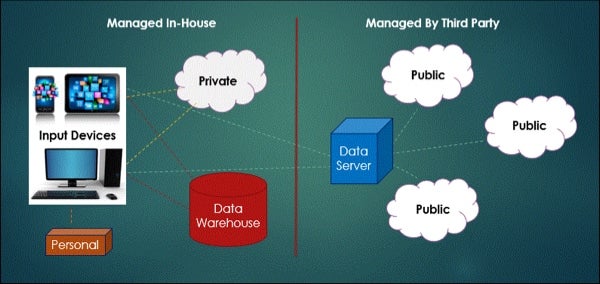

No comments:
Post a Comment
Note: Only a member of this blog may post a comment.